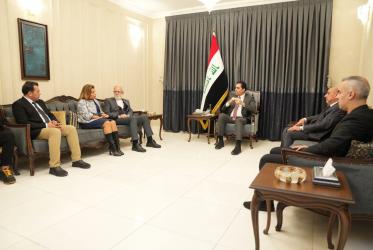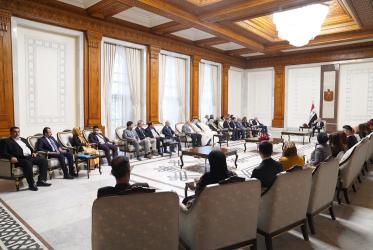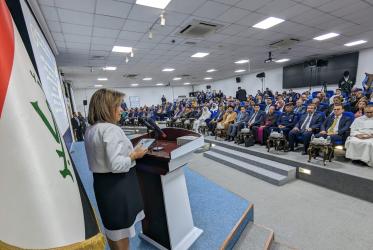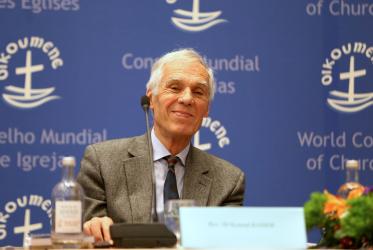at the Ecumenical Centre
Geneva March 2003
Konrad Raiser
The beginning of the war against Iraq in the early hours of today calls for a moment of sober reflection and spiritual discernment. It seems to have thrown us back quite brutally into a world governed by the law of the strongest. The delicate fabric of an international legal order and the functioning of the United Nations which was founded upon the commitment to "liberate the world from the scorge of war" seem to be undermined. The voice of millions in all corners of the world who have protested the preparation of this war scenario has gone unheard. The warning by government leaders and diplomats who have pointed to the wider dramatic consequences of war against Iraq has been pushed aside. Many now feel helpless, full of anger and fear at the same time.
Of course, this is by no means the first time that the United States has used military means unilaterally and in defiance of the explicit prohibitions of the charter of the United Nations to defend its interests. Other governments as well, including the government of Iraq, have continued to consider war a legally justified means to achieve political objectives. But never before has the framework of the international order of peace which was built over these last 50 years been challenged more openly than by the present policies of the US government and its allies.
The words of the psalm which have just been read invite us to listen to the voice of God, and call us to an act of spiritual discernment. Some of us will recall that this very passage has served once before as the basis for a famous meditation in a situation of impending war: In 1934 Dietrich Bonhoeffer used the words of this psalm to develop his passionate plea for peace as God´s concrete commandment. "Today God´s commandment for us is the order of international peace. To say this is to express a quite definite recognition of the will of God for our time." It was this understanding of the concrete commandment which enabled Bonhoeffer to cut through the deceptive identification of peace with security and to maintain that the struggle for peace must never compromise with the demands of justice and truth. "As certainly as we leave the making of the last peace to God, so certainly should we also make peace to overcome war. It is obvious that struggle as such will not be driven out of the world in this way, but here we are concerned with a quite definite means of struggle which today stands under God´s prohibition."
Bonhoeffer was clearly ahead of his time and it has taken more than 50 years for the ecumenical movement to return to Bonhoeffer´s insight. The conciliar process for justice, peace and the integrity of creation which was launched following a recommendation of the WCC assembly at Vancouver in 1983 was an indirect response to Bonhoeffer´s appeal. The World Convocation of 1990 at Seoul said in its affirmation of the "Peace of Jesus Christ": "We commit ourselves to practice non-violence in all our personal relationships, to work for the banning of war as a legally recognized means of resolving conflicts, and to press governments for the establishment of an international legal order of peacemaking." Two years ago the World Council of Churches launched the "Ecumenical Decade to Overcome Violence" which is meant to reinforce the commitment accepted at Seoul on behalf of all member churches.
How then do we respond today to the political, ethical and spiritual challenge of war having been declared allegedly with the purpose of restoring peace and justice? President Bush in the effort to impose his war agenda on the international community has increasingly been invoking religious, even divine legitimation for his intention to disarm Iraq by force. He must be confronted by God´s concrete commandment: "Let me hear what God the Lord will speak, for he will speak peace to his people, to his faithful, to those who turn to him in their hearts. Surely his salvation is at hand for those who fear him, that his glory may dwell in our land." Our first response will, therefore, have to be an act of defiance: denouncing this misuse of religious language in order to justify an act of war violating the legal order which was developed to protect world peace.
And this is perhaps the most remarkable and at the same time the most encouraging development during these last weeks: In an unprecedented manifestation of unanimity Christians and churches of all traditions and in all parts of the world have united their voices in denouncing this war as immoral, illegal and unwise. Never before has there been a similar act of common, prophetic discernment by all the churches together. The churches in the United States have shown great courage in their act of speaking the truth to power. There is no reason to feel discouraged that their voice has not been heard, that the government has even refused to hear them. Rather, we should celebrate the fact that for the first time the churches together have placed the commandment of God above their respective political loyalties. God wills peace for God´s people, for this world and therefore the institution of war must be overcome, war must be outlawed as a legally recognized means for resolving civic or interstate conflicts. The united voice of the churches represents a spiritual power that the governments will have to recognize.
In our commitment to the peace of Christ, a peace that surpasses all understanding and is not the peace that the world can give, we are nevertheless called to become peacemakers under the conditions of this world and of human history. The Decade to Overcome Violence does not pretend that at the end of the period of ten years all manifestations of violence and of violent conflicts will have been eliminated. But it aims at establishing in the conscience of Christians and the churches that conflicts should be resolved by peaceful means under the rule of law. The World Council of Churches since its beginning has been a staunch advocate of the multilateral order of peace established through the United Nations - not withstanding occasional criticism of the actions and policies of the United Nations.
There is no reason to consider that with this war against Iraq the United Nations have lost their credibility. On the contrary: The vision of a world liberated from the scorge of war is more pertinent than ever before. The sheer fact that the overwhelming majority of member states of the UN have rejected the project of war against Iraq is an indication that the basic values upon which the UN has been founded are still being affirmed. The war against Iraq is not a defeat for the United Nations, but a moral and political defeat for the government of the United States and her allies. All efforts should, therefore, be directed to strengthen the hand of the United Nations and the rule of law as the most effective means to achieve a viable order of international peace founded upon justice.
We have heard the promise of the psalm: "Steadfast love and faithfulness will meet; righteousness and peace will kiss each other. The Lord will give what is good, and our land will yield its increase. Righteousness will go before him, and will make a path for his steps." In all our fears and uncertainties in these times of war we can entrust ourselves to this promise. God wills peace with justice, not only for God´s people but for this world. We are called to be witnesses to this promise and to act on God´s will for our time.



